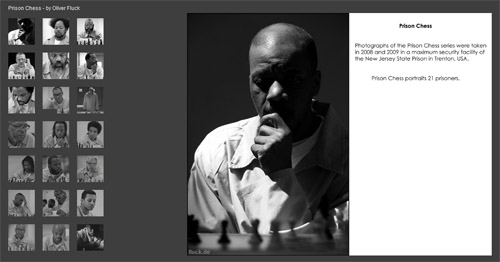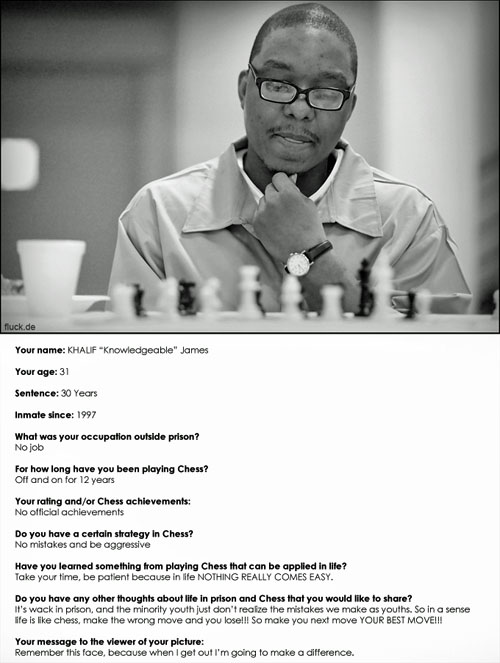Images of Prison Chess… by Oliver Fluck

In our world of chess we play in a variety of environments… hotels, schools, barber shops, busy streets, parks, museums, office board rooms, malls, front porches and even balconies. Regardless of where chess is played the surroundings is often replaced with the world on the 64 square chess board.
Chess is also played (ironically) in a place where chess represents a metaphor of its own environment… prison. Many prison inmates have taken up chess to insulate themselves from the harsh realities of their environment. Chess is said to be a refuge for prisoners and a way of solving life problems over the board. The game is not only a good way to pass time, but also a way to instill discipline, focus and sharpen one’s mental acumen. There had been studies to show that chess has helped recidivism rates.
There are some very famous prisoners in chess history, mostly notably Claude Bloodgood. However, there is lots of talent throughout the prison system that often goes unnoticed. Back in 2008, Oliver Fluck took on a project where he photographed prisoners and asked basic information about their background. What has resulted was a very interesting insight as to how chess has become a part of a culture shared by practically every conceivable demographic.
The images are very interesting in that it shows what lessons can be learned from chess and how such an environment can help a chess player see different benefits. When reading the profiles, you will no doubt get some of the pearls of wisdom from people who have experienced things that the average person would never imagine.

https://series.fluck.de/series20/index.html

I realized information without application is nothing. In chess you get the application and the information in the heat of the battle. I learned how to play chess in Federal prison. The guys that played chess were smart in my opinion. This one chess player name Sims from SC who worked in the Law Library with 30 years stood out. What made Sims standout was he was a book writer and an editor for publishing company in the free world. In order to play Sims you had to move up the ranks on the recreation yard. I had the opportunity play Sims in the Library and the staff would watch his game because he was so tactical and was a big trash talker, he made the game fun and exciting. I fell in love with the principles of chess. Today I use those principles to help transform my life. Today I am married, home owner, self-employed an author of a book Conspired Redemption. I use chess as an analogy in the book to make key points. Chess help recidivism? The chess players I know are free and living a productive life. The data say 85% return and 15% stay free. I wanted to be in that 15%. I don’t know how many are chess player, but I would bet 12% of the 15%. The best chess player was a tutor at the school in prison, the brother was so discipline you could not get a game from Shakur until the weekend; he was on some time management in prison. I also became a tournament director and a member of the USCF.
I started a chess club at my college in Little Rock, Arkansas, and a chess club in Little Rock, Ark the Urban Knights and Kingsmen chess club in the state of Florida. I would like to see more chess player build on their chess skills after their release. From my experience the chess lesson can put you in a better position in life.
Well stated and a wonderful story. I understand that these brothers on the inside have keen minds, but being able to use that energy is not easy. Chess offers a constructive avenue. Unfortunately, the USCF commission on prison chess is rather inactive.
I found this article to be very enlightening. I have 2 nephews who I tried to show the moves and share the joy of chess before prison. They were not interested at the time. Now … they have both been released within the past year and could not wait to challenge me. Needless to say after a dozen games I am still untied & Undefeated. But We are sharing the joys of chess. The black & white photos are an excellent way to portray Prison Chess … a world within a world within a world.
[i’m commenting on the prison chess item of months ago.]
there is now a uscf prison chess committee. larry storch of florida
is the chair. i am the prison chess coordinator for the mass. chess ass’n. we send chess magazines and chess books to facilities and inmates nationwide. if you know of institutions willing to accept donations please advise.
I’m interested. I know Larry Storch and I’m a member of the Board of the Florida Chess Association. I believe he assumed that post at the last U.S. Open.
It is very difficult to deal with the prison, but it is a worthful effort.
I’m very interested in Keith Dunbar’s perspective on what factors determine the 15% who stay free, vs. the 85% who don’t.
I have a lot of experience in working with disadvantaged youth in school situations, using chess. It does seem to open a window to improved self-esteem and intellectual self confidence for those who embrace it.
But my limited observations involving people in the criminal justice system, in this case working with young offenders at a juvenile half-way house, indicated a different set of issues, which I’m not sure that chess alone can address effectively. The young men I interacted with did lot lack self-confidence! They certainly believed they were smart. In fact, believing that they are “smarter than everyone else” might be part of the problem. My conclusion is that in many (not all) cases, they have a VALUES problem.
What do you think?
Great article to read on how a simple chess game made positive changes in one life live
Remarkable! I say…( Life’s a Dance, you Learn as you go…) Chess gives you so many options to move that if you fail and move the wrong way, you will always know that there is always a better move you can make for your tomorrow that will be better than your yesterday.